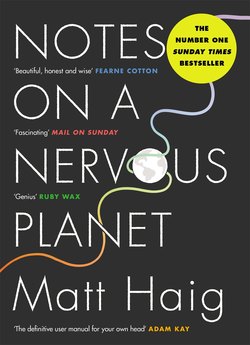Читать книгу Notes on a Nervous Planet - Matt Haig - Страница 11
На сайте Литреса книга снята с продажи.
ОглавлениеA life edit
I WAS SCARED. I couldn’t not be. Being scared is what anxiety is all about.
The bouts were becoming closer and closer. I was worried where I was heading. It seemed there was no upper limit to despair.
I tried to distract myself out of it. However, I knew from past experience alcohol was off limits. So I did the things that had helped before to climb out of a hole. The things I forget to do in day-to-day life. I was careful about what I ate. I did yoga. I tried to meditate. I lay on the floor and placed my hand on my stomach and inhaled deeply – in, out, in, out – and noticed the stuttery rhythm of my breath.
But everything was difficult. Even choosing what to wear in the morning could make me cry. It didn’t matter that I had felt like this before. A sore throat doesn’t become less sore simply because you’ve felt it before.
I tried to read, but found it hard to concentrate.
I listened to podcasts.
I watched new Netflix shows.
I went on social media.
I tried to get on top of my work by replying to all my emails.
I woke up and clasped my phone, and prayed that whatever I could find there could take me out of myself.
But – spoiler alert – it didn’t work.
I began to feel worse. And many of the ‘distractions’ were doing nothing but driving me further to distraction. In T.S. Eliot’s phrase from his Four Quartets, I was ‘distracted from distraction by distraction’.
I would stare at an unanswered email, with a feeling of dread, and not be able to answer it. Then, on Twitter, my go-to digital distraction of choice, I noticed my anxiety intensify. Even just passively scrolling my timeline felt like an exposure of a wound.
I read news websites – another distraction – and my mind couldn’t take it. The knowledge of so much suffering in the world didn’t help put my pain in perspective. It just made me feel powerless. And pathetic that my invisible woes were so paralysing when there were so many visible woes in the world. My despair intensified.
So I decided to do something.
I disconnected.
I chose not to look at social media for a few days. I put an auto-response on my emails, too. I stopped watching or reading the news. I didn’t watch TV. I didn’t watch any music videos. Even magazines I avoided. (During my initial breakdown, years before, the bright imagery of magazines always used to linger and clog my mind with feverish racing images as I tried to sleep.)
I left my phone downstairs when I went to bed. I tried to get outside more. My bedside table was cluttered with a chaos of wires and technology and books I wasn’t really reading. So I tidied up and took them away, too.
In the house, I tried to lie in darkness as much as possible, the way you might deal with a migraine. I had always, since I was first suicidally ill in my twenties, understood that getting better involved a kind of life edit.
A taking away.
As the minimalism advocate Fumio Sasaki puts it: ‘there’s a happiness in having less’. In the early days of my first experience of panic the only things I had taken away were booze and cigarettes and strong coffees. Now, though, years later, I realised that a more general overload was the problem.
A life overload.
And certainly a technology overload. The only real technology I interacted with during this present recovery – aside from the car and the cooker – were yoga videos on YouTube, which I watched with the brightness turned low.
The anxiety didn’t miraculously disappear. Of course not.
Unlike my smartphone, there is no ‘slide to power off’ function for anxiety.
But I stopped feeling worse. I plateaued. And after a few days, things began to calm.
The familiar path of recovery arrived sooner rather than later. And abstaining from stimulants – not just alcohol and caffeine, but these other things – was part of the process.
I began, in short, to feel free again.
